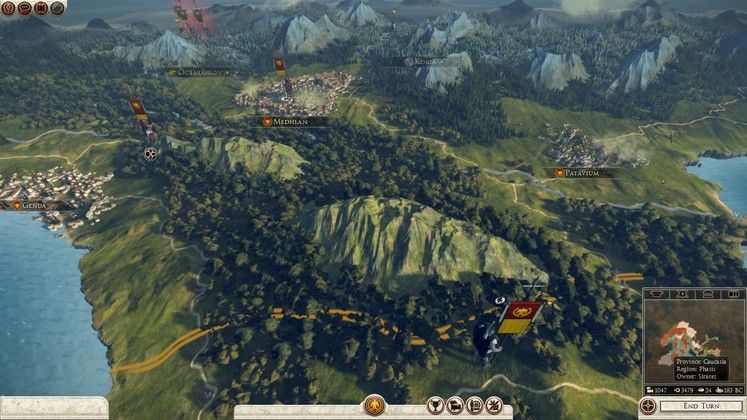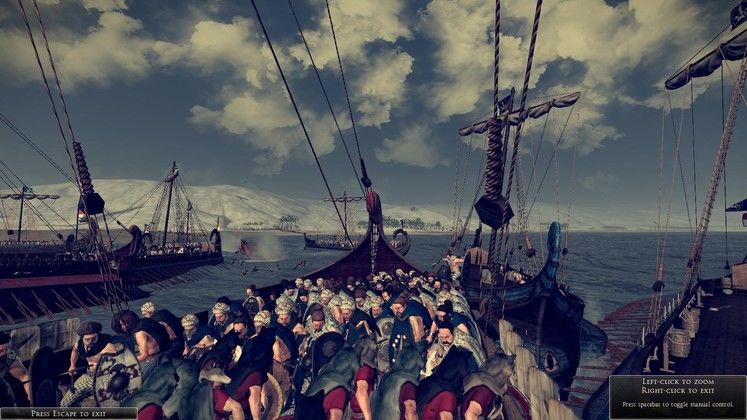 |
| Province management will take some getting used to, even for veterans, but it's a bit more active than in previous games. |
It also means you have to think long and hard about logistics, about the placement of your forces and zones of defence. Armies are costly, and can take a while to get into position. Given that you can’t just create random small ones anymore, you have to make sure your territories are covered. But this follows on to one of the main problems with Rome 2 – tension. A challenging game will give you a sweat; will make you worry about your decisions, about whether the AI will exploit the fact that you’ve left the whole of Italy exposed because all your legions are needed in the south. Rome 2, so far, has failed in that. The AI has never been particularly strong in the Total War games, but it seems positively tame in here, at least to the player.
In my playthroughs, I’m constantly getting notifications of factions falling, new factions arising, sometimes the same faction that keeps coming back (fight on Armenia, fight on). It’s a testament to the hidden depths this game has, that even though the world is pact with factions, minor and major, the team seems to have coded in a bunch more emergent factions as well, which can completely change the balance of power in an area. None of that seems to happen to, or be directed at the player though. What aggression routines the AI uses, it seems to also have Asimov’s three laws or robotics thrown in as well when it comes to dealing with humans.
 |
| Naval battles in Rome 2 are like nothing you've played before. They're a bit unwieldy but extremely challenging. Hybrids make for good fun. |
Politics. Now, even though the politics feature was only something that applied to Rome & Carthage, we were promised good things from this feature. Simply put, it hasn’t quite been delivered. The mechanic is there, although not in the form that I was originally shown a few months ago… evidence, perhaps, of the fact that featured had to be scaled back. Every army and navy has to be controlled by a member of either your house (if one is available), or another house. This does initially make you think about who you assign to what, but this quickly fades as you realise that nothing really happens. Even the ‘important people’ mini-events that crop up, few and far between as they are, seem a bit tame. Your house leader can be secured a ‘promotion’, but it’s only the one. You can adopt other generals into your house, and there are marriage and assassination options too, but you’ll never use them. Each character has a ‘Gravitas’ rating, which at first seems important, but really isn’t. On the diplomacy front… things are a little more transparent in the sense that you get a break down as to why a country likes/dislikes you, which is nice. The diplomacy interface is a bit clunky though, and even a simple task of finding trade partners can be a bit tiresome.
There are other points to consider, of course. Those of you who pre-ordered the game, assuming you didn’t go for the collector’s edition, would have probably paid £29.99 (or equivalent). Rome 2 is definitely worth £29.99, especially with the promise of things to come. Creative Assembly’s DLC plan sounds well thought out – more factions to slot into the ‘culture’ groups, allowing you to play a different flavour of the same culture, more historical battles (which I still doubt many people play, but they’re a bit of a spectacle). They’ve also talked about story-driven mini campaigns, which I think Napoleon, Shogun 2 and even Rome 2’s prologue have shown the studio know how to do quite well. Sure, they’re scripted, but this more focused guidance allows the game’s strengths to really shine, and like I’ve said, they ARE there.
Really, it’s the little things that are the biggest boon to this game: I personally love the new line of sight mechanic, and the new ways buildings can get town up add to the atmosphere in a fight. The hybrid battles are a wonderful addition, and all in all you can have some pretty magical fights. Even on the strategic level, the ways armies grow and get XP, the way you have to keep things under control on a provincial level, which can add some challenge to the game… the greatness is there. To be honest, there’s too much to talk about in one review – I realise I haven’t talked about multiplayer, or province improvement and construction, the tech tree… I could easily write paragraphs about all these things, and they are important, but it would only serve to re-enforce my ultimate conclusion about the game.
 |
| You can't really appreciate the scale until you play the game, even with all of those points highlighted, I can't actually see all of it. What lurks beyond? |
TOP GAME MOMENT
The new engine is stunning. When you do manage to get a decent battle going, it is a bit of a visual treat.




